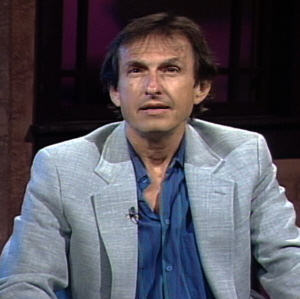Former Bay Cityan, Author Howard Kohn Now a Public TV Show Host in Maryland
The Last Farmer, Runner-up for a Pulitzer Prize, Still Draws Raves
June 29, 2008
By: Dave Rogers

Former Bay Cityan Howard Kohn is in a new role as host of a Maryland public television station show.
Bay City native Howard Kohn, author of the acclaimed book "The Last Farmer," describing life on a farm in Beaver Township, Bay County, Michigan, is spreading out from print media to television.
Kohn, a Central High and University of Michigan graduate who has had several of his books published, is hosting a show, "Second Look," on public television in Prince Georges County, Maryland, near Washington, D.C.
Mr. Kohn also is active in the local community, serving as Commissioner of the Takoma Park Neighborhood Youth Soccer league, and helped promote the construction of the new Montgomery Blair High School and the Takoma Park Community Center. He and his wife Diana, live in Takoma Park, MD. They have two children, Jennifer and Gregory.
Mr. Kohn is the author of three books, "The Last Farmer," runner-up for a Pulitzer Prize; "Who Killed Karen Silkwood?" which led to the Meryl Streep movie; and "We Had A Dream," a non-fiction examination of the aftermath of the civil rights movement in Prince George's County.
Mr. Kohn worked at The Bay City Times and The Detroit Free Press and then became a staff writer and Washington Bureau Chief for Rolling Stone Magazine. His work has also been published in The New York Times Sunday Magazine, Esquire, Mother Jones and other periodicals. During five years as bureau chief of the Center for Investigative Reporting he dug into the Karen Silkwood case. This involved a whistle-blower at a nuclear plant in Oklahoma who was mysteriously killed as the probe was in progress.
Ironically, a priest who had served at the Guadalupe Center on Broadway in Bay City, Father Wally Kasuboski, was an activist working with Ms. Silkwood during the time she was killed.
"The Last Farmer" is described by one reviewer as "a wonderful book that examines a father and son relationship in a Midwestern farming community. The struggles between generations and the authors own internal conflicts brought me to tears. The author captures the German-Lutheran morality and displays it affectionately. I loved this book because it showed the difficulty in following ones own dream, perhaps at the cost of someone else's dream. How to be true to oneself and find respect for making life's difficult decisions."
THE LAST FARMER An American Memoir. By Howard Kohn. 270 pp. New York: Summit Books. $18.95.
Another reviewer wrote: "We humans are rarely just one person at a time. In this book, Howard Kohn, the sharp-minded investigative reporter, has turned his talents loose on Howard Kohn, the man, probing for the truth of himself.
"Central in 'The Last Farmer' is Mr. Kohn's uneasy relationship with his father, an immensely appealing, earthy and old-fashioned man, who clings tenaciously to the family acres in Michigan's Saginaw Valley. Mr. Kohn escaped the imprisoning farm at age 18 and visits periodically, each time more uncertain about his own identity and his role as eldest son. 'I was the flipside of my father,' he writes. 'Where he was rooted in the earth, I was on the loose and on the make. And each day I was away from the farm, the more incomprehensible my father's life seemed to me.'
"The book might easily have kept to that ageless ritual of father and son coming to terms with each other, but Mr. Kohn, as we learned in his book 'Who Killed Karen Silkwood?,' rejects one-dimensional answers in favor of harsh and conflicting contemporary realities. In asking what will become of his aging father and the Kohn land, he strips sentimentality from the words 'family farm' and shows us that traditional ways of farming are in grim competition with large-scale farms that use polluting chemicals. Oil speculators circle the Kohn farm like hunting dogs. A nearby nuclear plant, $2 billion over budget and unfinished, is a symbol of careless change. Unpredictable weather and fluctuating markets are constant companions. But 'the last farmer' hangs on.
"Against this background, Mr. Kohn tries to reconcile two ways of life, finding that he cannot create a true relationship with his father until he can feel - and act - like an adult. 'On every visit I was older, but once I arrived I did not feel older. I felt like a boy. And I had the sensation of being in a single instant lost, undone, stripped of my accomplishments in the world outside the valley.'
Relentlessly prodded by Howard Kohn the reporter, Howard Kohn the man finds he can no longer straddle and commute uncommitted between past and present. He must decide who he is and who and what have valid claims upon his life. 'One way or another,' he writes, 'for better or worse, we all have the past with us, and it may be that mine will always be for me a paradox of ancestors I never knew, and a father I got to know so late, and another ghost - my own - that I am still tripping over. . . . And shouldn't I have known that a son, when he comes home, no matter the kind of home, no matter his age, cannot help but become in some fashion the boy he used to be? Don't all of us have to complete a circle of comings and goings before we grow up?'"###